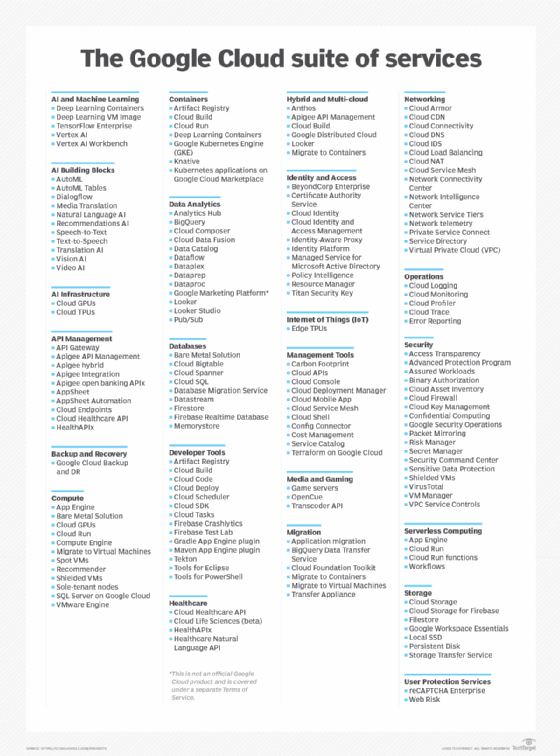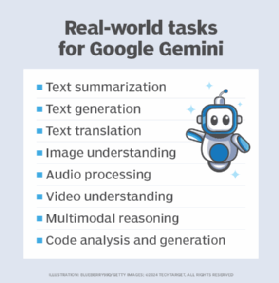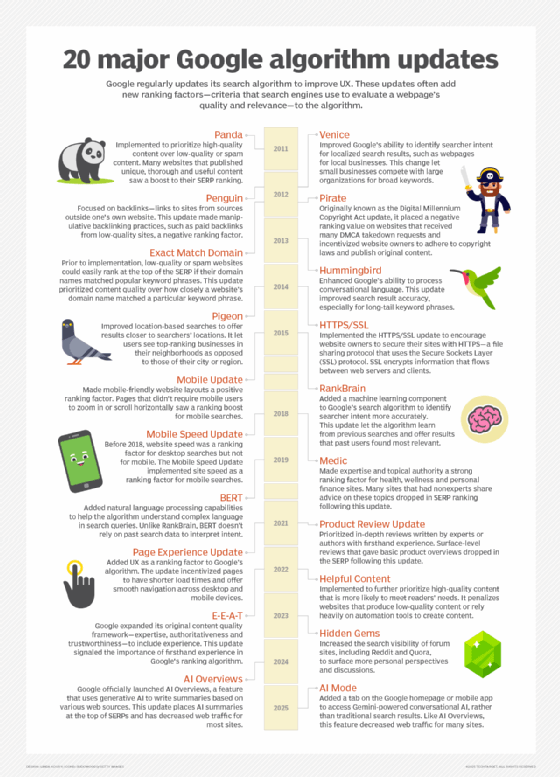What is Alphabet Inc.?
Alphabet Incorporated (also known as Alphabet Inc. or simply Alphabet) is a conglomerate of numerous companies, including the search engine giant Google. In 2015, Alphabet became Google's holding company. As of 2025, Google, along with many other companies like Fitbit, Waymo and Mandiant, remains a wholly owned subsidiary of Alphabet.
History of Alphabet Inc.
Google Inc. co-founders Sergey Brin and Larry Page created Alphabet Inc. on Oct. 2, 2015. They announced their intentions to create a new holding company in August 2015. Alphabet was the result of its wish to strategically restructure the original company to make it cleaner, leaner, and more accountable to its investors and customers.
With this change, Alphabet replaced Google Inc. as a publicly traded entity. Alphabet also became the parent company for many other businesses that originally fell under the Google Inc. umbrella and for other companies acquired after the 2015 split. The company is incorporated in Delaware; its headquarters are at Googleplex in Mountain View, Calif.
According to Larry Page's open letter on the Alphabet Investor Relations page, it says he and Brin chose the name "Alphabet" because the word means "a collection of letters that represent language, one of humanity's most important innovations, and is the core of how we index with Google search." Page also said they favored the name because it breaks down into alpha-bet. In a financial context, alpha means investment return above benchmark, which is what the company has always strived for, according to Page.
Alphabet on the stock market
As part of the transition from Google Inc. to Alphabet, all Google shares were transferred to Alphabet stock on a share-for-share basis, with the former automatically converting into the same number of shares of the latter, with all the same rights.
Alphabet trades on the Nasdaq composite under Google's former ticker symbols, GOOG and GOOGL. These symbols represent two types of shares. GOOGL shares are Class A shares or common stock. These shares confer ownership stake and voting rights on stockholders. GOOG shares are Class C shares that confer no voting rights on holders. By issuing Class C shares, Brin and Page were able to preserve their control while also positioning the firm to take advantage of liquidity in the public market.
During a five-year period between December 2018 and December 2023, Alphabet's net income increased by 23% and its revenue by 18.%. Its gross margin also increased by 61%, and cash flow rose 25%. Between March 2024 and January 2025, the share price fluctuated between $131 and $206. Toward the end of January 2025, GOOG shares were trading on Nasdaq composite at over $200.
Alphabet products and services
Alphabet offers a broad range of digital products and services. Its most famous product is the Google search engine, which was launched in 1999 and occupies the largest market share as of January 2025. Some other popular products from Alphabet under the Google umbrella include the following:
- Gmail. This is a free email service.
- Android. Android is a mobile OS that runs on most of the world's smartphones.
- YouTube. This is a video-sharing platform, available in both free and paid (ad-free) versions.
- Google Play. Google Play is a store for free and paid smartphone apps and games.
- Google Maps. Google Maps is a free mapping service that uses GPS and real-time location data to display maps and satellite images on a user's portable device.
- Google Chrome. Google Chrome is a free, device-agnostic website browser.

Besides these consumer products, Google's product suite also includes products for business use:
- AdSense. This is a revenue-generation tool for content creators.
- Google Analytics. Google Analytics is a set of tools for marketers to understand and optimize customer journeys across devices and platforms.
- Google Trends. Google Trends is a simple tool to find trending topics and use these insights to inform marketing or content creation decisions.
- Google Web Designer. This is a tool to help businesses create videos, images and ads.
Other well-known Google products include Google Cloud, a cloud computing platform that allows users to access numerous services over the cloud, and the Google Workspace suite of cloud-based productivity apps.

In recent years, Google has scaled up efforts to develop its AI capabilities and product suite. This has yielded products such as the following:
- Google Assistant. This is a voice-activated AI assistant that can work autonomously.
- Google Gemini (formerly Bard). Google Gemini is a generative AI (GenAI) chatbot that communicates in natural-sounding human language.
- Gemini Code Assist. This is a conversational AI tool that offers real-time code recommendations using a chat interface.
- Vertex AI platform. Vertex AI is a tool that helps AI engineers create, train, test, and deploy machine learning and AI models.
- DialogFlow. DialogFlow is a solution that enables businesses to build natural conversational experiences into smart devices, mobile applications and interactive voice response (IVR) systems.

Alphabet's offerings also span products and services such as the following:
- AI research and consultancy.
- AI infrastructure (CPUs and GPUs).
- Cybersecurity research and consultancy.
- Smartphones.
- Smart home products (speakers, thermostats, etc.).
- Wearables.
- Digital marketing campaign creation tools.
- Autonomous vehicles.
These products are independently developed and marketed by Alphabet's many other (non-Google) subsidiaries.
Alphabet subsidiaries
Between 2015 and 2025, Alphabet acquired more than 150 companies, many of which occurred after the first few years of its inception. Notable acquisitions for Alphabet include the following:
- Fly Labs. Video editing software.
- Synergyse. An interactive learning platform.
- Kaggle. A data science competition platform.
- Fitbit. Wireless-enabled wearable devices like pedometers and heart rate monitors.
- Typhoon Studios. Canadian video game development company.
- BrightBytes. An edtech data analytics platform that provides educators with actionable insights to enhance students' learning outcomes.
- Mandiant. A cybersecurity company specializing in cyberdefense, threat intelligence and incident response service.
- Calico. A life sciences company that researches nanotechnology, cryonics and other technologies with the goal of extending human lifespans.
The wide range of acquisitions highlights Alphabet's willingness to look beyond its Google search roots and, as Page said in his investor letter of 2015, to contain "the companies that are pretty far afield of our main internet products" within Alphabet.
Despite Alphabet's expansion, Google remains one of its largest subsidiaries. In addition to the original search engine and digital advertising businesses, Google maintains control over many of its other profitable legacy businesses for Alphabet, including YouTube, Android OS, Google Maps, Gmail and Google Cloud.
Other offshoots of the former company including GV (formerly Google Ventures); CapitalG (formerly Google Capital); X, The Moonshot Factory (formerly Google X); and Google Nest (formerly Nest Labs) are also Alphabet subsidiaries. These companies are considered part of the "Other Bets" segment of Alphabet. They bring in relatively little revenue but allow Alphabet to expand its presence into more domains where it can continue developing innovative products and services.
Each subsidiary has its own CEO in keeping with the founders' aim to have a strong CEO to run and lead each business toward its future. Also, because Google still brings in a bulk of Alphabet's revenue, it allows the other subsidiaries more room for experimentation and risk-taking. Sundar Pichai is the CEO of Google and Alphabet.

Alphabet competitors
Alphabet is one of the world's biggest companies in revenue and profits. It is also one of only about 10 companies with over $1 trillion market capitalization. Other notable companies in this elite club include the following:
- Apple.
- Nvidia.
- Microsoft.
- Amazon.
- Meta.
- Tesla.
- Berkshire Hathaway.
Some of these companies are also considered competitors of Alphabet because they operate in similar areas or offer similar products.
For example, Microsoft offers a cloud computing platform called Azure that's similar to Alphabet's Google Cloud Platform, and a search engine called Bing that's similar to Google search. In the cloud space, particularly in the CRM market, Google competes with Salesforce. Similarly, the Google Pixel smartphone competes with Apple's iPhone while Google and Meta compete in the areas of digital advertising and communications.
Other notable competitors of Alphabet (and Google) are as follows:
- Spotify competes with YouTube Music.
- Netflix competes with YouTube.
- Oracle, IBM and HP Inc. compete with Google Cloud.
- Amazon competes with Google Cloud, Google Search, Google Ads and Google Assistant.
Alphabet leadership
At the time of Alphabet's founding, Brin was its president and Page its CEO. They both resigned from their respective positions in December 2019. Google's former product chief, Sundar Pichai, then stepped in as CEO. He had already been appointed CEO of Google in 2015.
Even before he was appointed Google CEO, Pichai had taken on product and engineering responsibility for the company's internet businesses. During his tenure, he oversaw the development of numerous new initiatives and product launches, including Google's mobile OS Android, the Pixel smartphone, Google Meet video conferencing platform and Google Workspace (formerly G-suite) suite of cloud-based productivity apps.
Some of the other key people at Alphabet include the following:
- John LeRoy Hennessy, chairman.
- Ruth M. Porat, president and chief investment officer.
- Anat Ashkenazi, CFO.
- Robert E. Andreatta, VP-finance, business controllership and operations.
Lawsuits and controversies
Like many other large technology behemoths, Alphabet has found itself at the center of numerous legal troubles since its inception. Many of these troubles concern the company's anticompetitive business practices and antitrust violations.
In August 2024, a U.S. District Court ruled that Google's search engine operates as a monopoly in the USA and unfairly blocks competitors from expanding their search engine market share. This practice was deemed a violation of the USA's Sherman Antitrust Act (Section 2), which prohibits businesses from restraining interstate commerce using conspiracies or unfair contracts. Google has said it will appeal this decision; no determination has been made as of February 2025, on what penalties Google will incur.
Google has a long history of antitrust violations and subsequent punishments that predate the 2024 lawsuit. For example, the EU imposed a fine of €4.3 billion ($4.5 billion) on Google for creating an unfair monopoly in the mobile OS space with Android. The company also has faced numerous antitrust and class action lawsuits in 2020, 2023 and other years, all of which accused it of engaging in anticompetitive conduct that enhanced its power at the cost of its competitors.
Learn how GenAI search is transforming online searching. Compare traditional search engines with GenAI and discover how this new technology is revolutionizing the way information is accessed. Explore the AI Overviews feature in Google search, which uses GenAI to provide brief summaries of topics along with links to relevant web content in response to specific search queries.